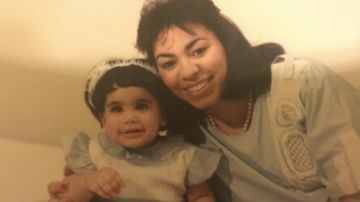How My Dominican Mom Helped Me Embrace My Afro-Latina Beauty
My heart always aches whenever a woman of color tells me how difficult it was for them to embrace their brown skin growing up

Photo: Courtesy of Johanna Ferreira
My heart always aches whenever a woman of color tells me how difficult it was for them to embrace their brown skin growing up. I definitely struggled with my fair share of insecurities especially during my pre-teen years, that consisted of everything from having frizzy, curly hair to being insanely thin, and having a thick uni-brow that I was constantly bullied for. But despite growing up in a Dominican family and always being around Latino communities — where colorism was and still is a major problem — having brown skin never made me feel less beautiful. I know that having the mother that I have, plays a huge role in why.
“You have beautiful skin,” I remember my mom constantly telling me, even in the summer when my naturally caramel/tan complexion would turn into a darker, bronzer shade. My mom has olive skin but a warm olive tone that very easily turns brown the second she’s out in the sun. She was always very rebellious and intolerant to any of the racism or colorism we’d constantly hear in our community. While fairer complexions and straight hair were constantly being praised, my mother made it a point to constantly celebrate my beauty — my brown skin and curly hair. While it took me years to fully appreciate my curls because of the “pelo malo” rhetoric I was constantly exposed to — especially in the Dominican Hair Salon space — I quickly believed my mom when she told me I had a beautiful complexion.

Even my abuelitas, who were constantly making comments like “Fulana is beautiful because she’s blanca,” were always telling me I was pretty even during my funky ass years. I never believed them, especially when I was 13, wearing glasses, braces, kids clothes, and rocking a full head of frizzy curls I couldn’t manage at all. But I did believe my skin was beautiful, so much so, that I never avoided the sun during the summer months. It never bothered me when Latino boys my age would express that they only liked white or light-skinned Latinas — especially if those boys were around my complexion or darker. I immediately saw it for what it was — they were struggling with loving their own brown skin because of the dialogues they were hearing at home. I would often discuss it with my mami, who was quick to refer to that as complejo, which was a result of the white supremacy conditioning brought up by our Spanish colonizers.
It also helped to witness and see how my mom felt about her own beauty and identity. My mom has always been proud to be Latina, has always been proud to be Dominican, and despite not being as tan as I am, has always been proud to be brown. She’s always embraced her curves, her complexion, her features, and her identity. I don’t remember ever hearing my mom speaking negatively about dark skin. I don’t remember ever hearing anti-black rhetorics coming out of my mother’s mouth. If anything, what I do remember is seeing her quickly check anyone in our family who would say or entertain anything that was remotely racist, anti-black or fed into colorism. Seeing her confident in her own skin, made it that much easier for my sister and I to feel comfortable in our skin. She was my little sister’s biggest supporter when she decided to grow out her relaxer and go natural. Mami is constantly telling her how much she loves her pajon.


It took mami a while to take on labels like Afro-Latina, despite knowing she was, just because the language was very new to her. But you best believe that if you’re having a conversation about identity with mami today, she will be the first to proudly express and proclaim her Afro-Dominicana identity. To some this might seem like no big deal, but coming from island where being called negra or mulatta is considered an insult, where blackness is associated with everything negative, to witness your Dominican mom embrace all of that, is truly revolutionary and healing in so many ways. And I couldn’t be prouder of the example she’s given my siblings and I.
Even when I struggled to fit in or when fellow Latinxs kids refused to accept me as Latina because of my lack of Spanish fluency or my infrequent trips to the DR, I don’t remember ever not being proud to be a Dominican-American. Even when I was trying to figure out myself and my identity, I was always proud to be Latina and always proud to be a brown-skinned Dominicana, because of the example I was given at home. While it took for me to go to college and take Latin and Black studies courses for me to love my curls and understand the concept of being Afro-Latina, I did always understand that I was a mixed race Latina with African and indigenous roots because mami always made sure to break that down for us. I’ll never forget in middle school when I asked mami why we looked more like bi-racial celebs like Alicia Keys or Mariah Carey than Mexican telenovela stars, she explained to both my siblings and I that it was because we were Afro-descendant Latinos and that it was nothing to be ashamed of but instead something to take pride in.

Whenever abuela compliments me, she always makes a point to tell me I have a beautiful face, beautiful eyes, a beautiful smile, and un color hermosa. That always stood out to me, especially since I grew up hearing her and so many people in my family praising whiteness. For her and mami to make it a point to praise the beauty in my browness, made it easy for me to believe that my browness was what makes me beautiful. I don’t know if I would have felt so confident with my complexion living in a world that praises Eurocentric standards of beauty if I wasn’t given that praise and support at home. I’ll be honest.
There’s a reason why we fight for representation today, especially for brown and black girls. There’s a reason why we don’t just ask, we demand now to see brown and black actresses on the big screen, brown and black models on the covers of magazines, brown and black dolls on toy store shelves, and brown and black girls beautifully portrayed in children’s books. That’s because when we don’t see ourselves portrayed we feel unseen and when we feel unseen, we look at what is actually being represented as the standard. Lupita Nyong’o’s latest children’s book Sulwe, illustrated by Vashti Harrison, is about a smart and imaginative, dark-skinned, little Black girl. Her goal is to have the book inspire young girls to “walk with joy in their own skin.”


I think we really do underestimate the importance not just of representation but of raising our children with positive affirmations. I didn’t see myself represented in film, magazines, TV, or in mainstream media at all. The only Latina celebs I was looking up to growing up were Jennifer Lopez and Salma Hayek, who look nothing like me. But I had my mom there reminding me that I was smart, that I was passionate, that I was strong, that I was an independent thinker, that I was beautiful, and that I was capable of doing whatever I set my heart to. It’s because of the support I received from her that I grew up to become a very independent thinker, a storyteller, a journalist, and a writer with the aim to help other brown and Black women find stories that speak to them and find healing from whatever racial or intergenerational trauma they have experienced. It’s because of her that I learned to “walk with joy in my own skin” by the time I stepped foot in college. Even in my least confident moments, I knew deep down that I was smart, I was passionate, I was strong, and I was beautiful — and no one could tell me different. Not society, not my peers, or men. I am the strong, courageous woman, who is willing to show up today because of the mother that I have and I will forever be grateful for that. I’m proud of my mother and the woman she is and the woman she has helped me become.
Let us take every opportunity that we have to lift every brown and black girl — every brown and black woman — we know. Because our positive words have more power than we realize!

















